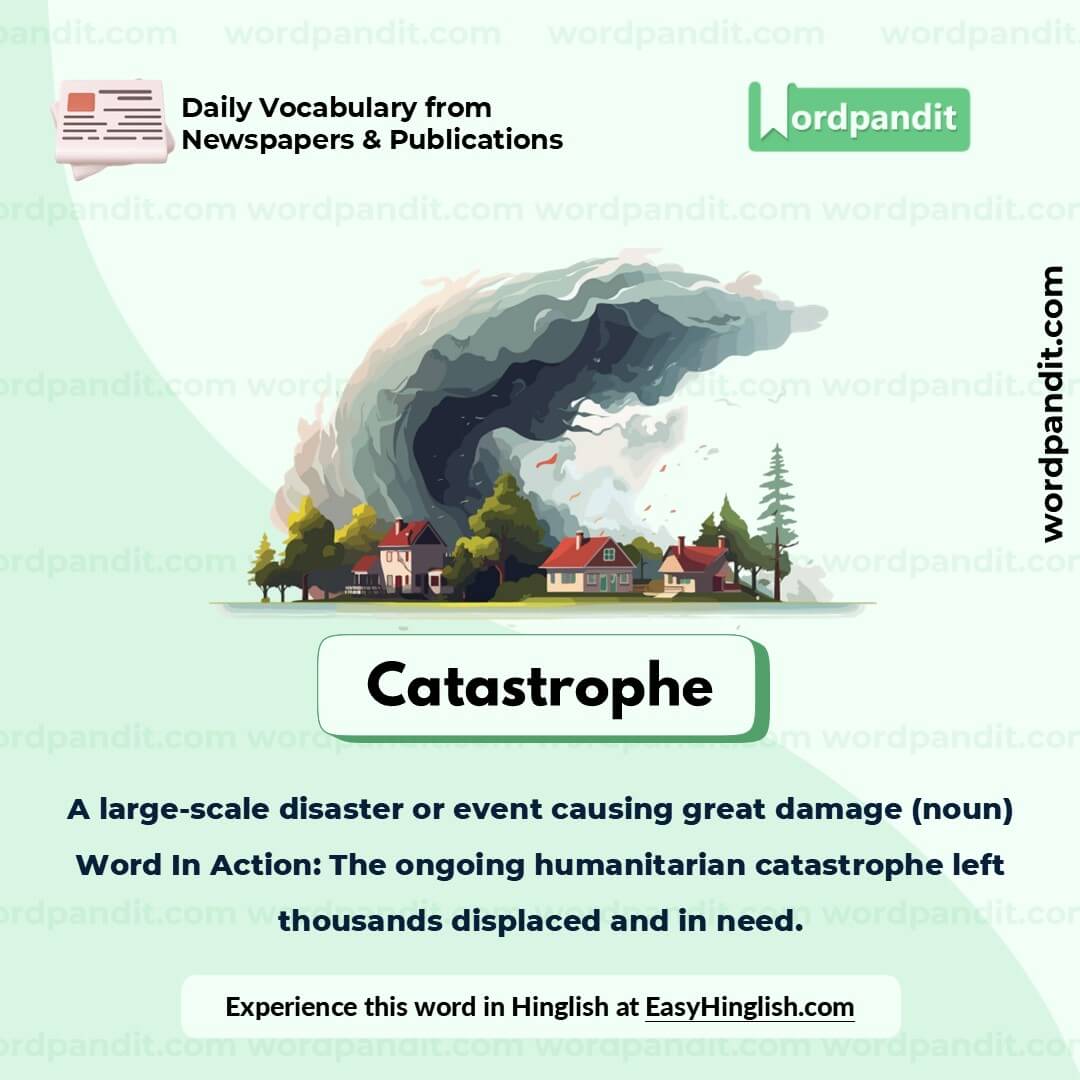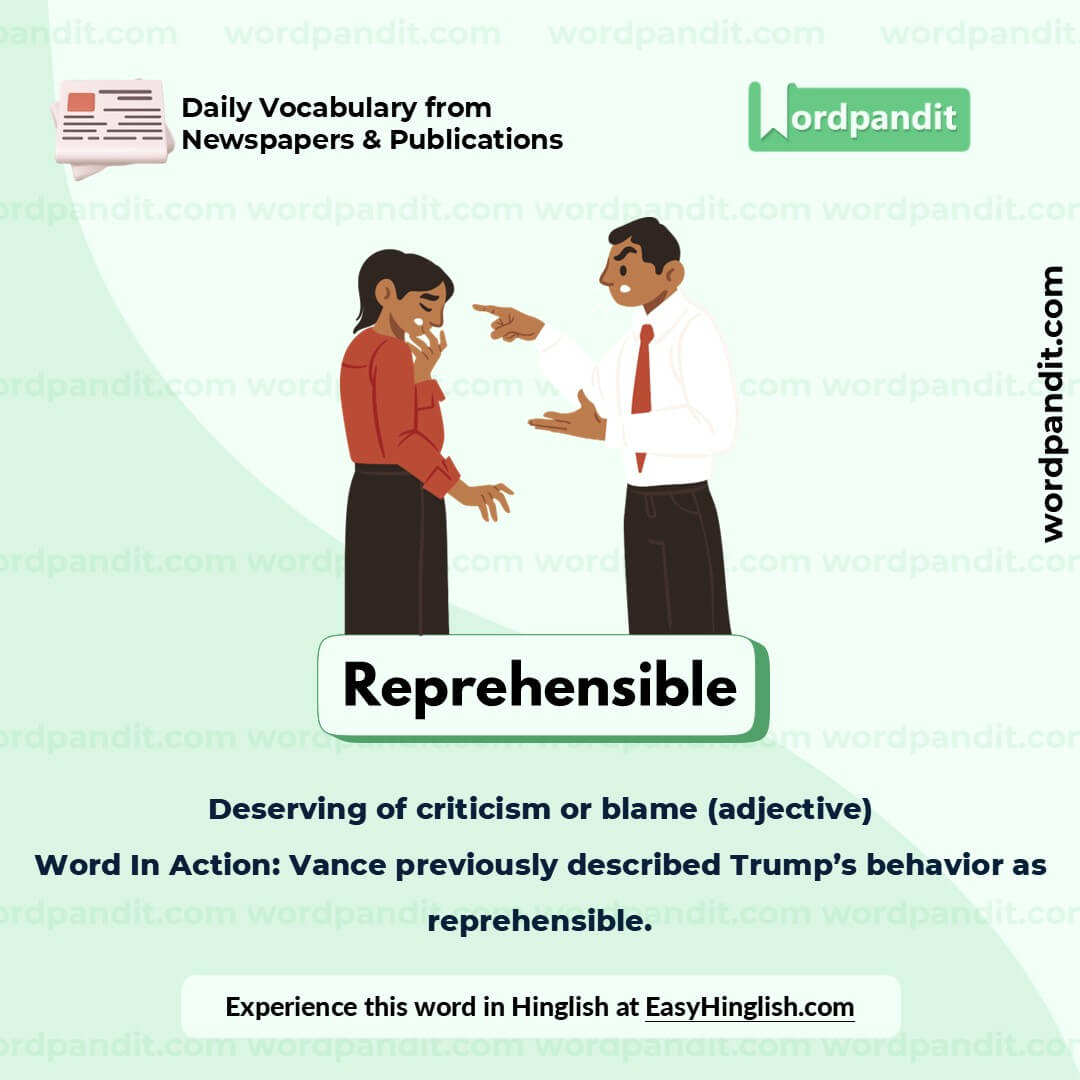Daily Vocabulary from International Newspapers and Publications
Expand Your Vocabulary with Wordpandit’s Global Vocabulary Hub
At Wordpandit, we are committed to helping you develop a truly global vocabulary by drawing from some of the most respected international publications. This section is designed to keep you ahead of the curve by introducing you to words that define global conversations and trends.
The Power of Global Sources
To help you think and communicate on a global scale, we curate vocabulary from renowned international sources, such as:
- The New York Times
- The Washington Post
- BBC
- The Guardian
- The Economist
- Scientific American
- Psychology Today
- And many more...
Stay Global, Stay Competitive
Our daily updates from international publications ensure you are consistently exposed to new words that reflect global news and developments, making sure your vocabulary is not only current but also globally relevant.
Enhance Your Global Perspective
Whether you’re preparing for international exams, aiming to excel in global business communication, or want to enhance your language skills for personal growth, Wordpandit offers the resources you need to thrive in a global context.
Effective Learning, Global Reach
Our learning methodology combines global examples, memory aids, and interactive activities, allowing you to internalize new words effectively and apply them in real-world scenarios.
Begin Your Global Vocabulary Journey Now!
Why Choose Wordpandit?
Practical Learning: Focus on words you'll actually encounter in real-world reading, enhancing your comprehension and communication skills.
Diverse Content: From current affairs to scientific breakthroughs, our varied sources expose you to vocabulary across multiple domains.
Effortless Integration: Make Wordpandit a part of your daily routine. Just a few minutes each day can significantly boost your lexicon over time.
Your Path to Vocabulary Mastery
- Visit our Daily Vocabulary section regularly
- Explore new words and their usage in context
- Practice incorporating these words into your own writing and speech
- Track your progress as your vocabulary expands
Start Your Journey Today
Embark on your vocabulary enhancement journey with Wordpandit. By consistently engaging with our daily posts, you'll build a robust vocabulary that serves you well in academic, professional, and personal contexts.
Remember, a word a day keeps linguistic limitations at bay. Make Wordpandit your daily companion in the quest for vocabulary excellence!
WORD-1: Incursion
Context:
"Israel’s ground incursion into Lebanon." - The Washington Post
Explanatory Paragraph:
An incursion refers to a sudden and brief invasion or attack, especially by military forces, into foreign or hostile territory. It can also describe any form of unwelcome entry or interruption into a space or situation.
Meaning: A sudden invasion or attack into a territory (noun)
Pronunciation: in-KUR-zhuhn
Difficulty Level: ⭐⭐⭐ (Advanced)
Etymology: From Latin incurrere, meaning "to run into or attack"
Synonyms & Antonyms:
Synonyms: invasion, raid, attack, assault
Antonyms: retreat, withdrawal, defense
Usage Examples:
- The military incursion into enemy territory was swift and unexpected.
- Villagers fled their homes after the rebel incursion into the area.
- The CEO's incursion into politics surprised many of his business associates.
- The company’s incursion into the European market was met with mixed reactions.
Cultural Reference:
"Military incursions have been a common tactic in territorial conflicts throughout history." - BBC News
Think About It:
What justifies a military incursion into another nation’s territory? How does it affect both the invading and invaded countries?
Quick Activity:
Think of a historical event that involved an incursion. How did it impact the region and the people involved?
Memory Tip:
Think of "incursion" as "in" + "cursion" (a run), describing a force running into or invading a place.
Real-World Application:
The term "incursion" is frequently used in military and geopolitical contexts to describe sudden attacks or invasions.
WORD-2: Catastrophe
Context:
"Ongoing humanitarian catastrophe." - The Washington Post
Explanatory Paragraph:
A catastrophe is an event causing great and often sudden damage, destruction, or suffering. It refers to disasters on a large scale, whether natural or man-made, and often involves loss of life or severe impact on communities.
Meaning: A large-scale disaster or event causing great damage (noun)
Pronunciation: kuh-TAS-truh-fee
Difficulty Level: ⭐⭐⭐ (Advanced)
Etymology: From Greek katastrophē, meaning "overturning" or "sudden disaster"
Synonyms & Antonyms:
Synonyms: disaster, calamity, devastation, tragedy
Antonyms: blessing, success, boon, miracle
Usage Examples:
- The earthquake was a catastrophe that left thousands homeless.
- The oil spill was an environmental catastrophe that took years to clean up.
- Without intervention, the famine could turn into a humanitarian catastrophe.
- The fire at the factory was a financial catastrophe for the business owners.
Cultural Reference:
"Natural catastrophes like hurricanes and tsunamis can alter the course of history." - National Geographic
Think About It:
How can governments and communities better prepare for catastrophes to minimize their impact on human life and property?
Quick Activity:
Think of a recent catastrophe and list the immediate and long-term effects it had on the affected area.
Memory Tip:
Remember "catastrophe" by picturing something collapsing or overturning, causing widespread destruction.
Real-World Application:
The word "catastrophe" is often used in news and media to describe large-scale natural disasters or major crises.
WORD-3: Reprehensible
Context:
"Vance previously called Trump 'reprehensible'." - The Washington Post
Explanatory Paragraph:
Reprehensible describes behavior or actions that deserve strong criticism or condemnation. It is often used to indicate that something is morally wrong or unacceptable, worthy of disapproval.
Meaning: Deserving of criticism or blame (adjective)
Pronunciation: rep-ri-HEN-suh-bul
Difficulty Level: ⭐⭐⭐ (Advanced)
Etymology: From Latin reprehendere, meaning "to rebuke" or "reprimand"
Synonyms & Antonyms:
Synonyms: deplorable, disgraceful, shameful, inexcusable
Antonyms: commendable, praiseworthy, admirable, honorable
Usage Examples:
- The politician's actions were deemed reprehensible by the public.
- Lying under oath is a reprehensible offense in a court of law.
- The company's treatment of its workers was reprehensible and led to public protests.
- Cheating on the exam was a reprehensible act that got him expelled from school.
Cultural Reference:
"Reprehensible actions by public figures often lead to widespread condemnation." - The New York Times
Think About It:
What kind of actions are considered reprehensible in modern society? Are there situations where reprehensible behavior is justified?
Quick Activity:
Think of a time when you witnessed or heard of reprehensible behavior. How did you feel about it, and what action did you take?
Memory Tip:
Remember "reprehensible" by associating it with "reprimand," since it refers to something deserving of strong criticism.
Real-World Application:
Reprehensible is often used in media and discussions about ethics to describe behavior that is morally wrong or unacceptable.
WORD-4: Reinventing
Context:
"Adept at reinventing himself." - The Washington Post
Explanatory Paragraph:
Reinventing means to change or transform something, usually oneself or an approach, in order to appear new or different. It often involves making significant changes to adapt to new circumstances or improve upon past behavior.
Meaning: To change or transform, especially oneself (verb)
Pronunciation: ree-in-VEN-ting
Difficulty Level: ⭐⭐ (Intermediate)
Etymology: From Latin re- meaning "again" and invenire, meaning "to find"
Synonyms & Antonyms:
Synonyms: transform, renew, remodel, revamp
Antonyms: maintain, preserve, stagnate
Usage Examples:
- He spent years reinventing himself as a successful entrepreneur after his initial failure.
- The company is reinventing its brand to appeal to a younger audience.
- After losing the election, she reinvented her political career by focusing on local issues.
- The actor is known for reinventing his image with each new film role.
Cultural Reference:
"Reinventing oneself is common among public figures trying to adapt to changing trends and expectations." - Forbes
Think About It:
Why do people feel the need to reinvent themselves, and what are the benefits and challenges of doing so?
Quick Activity:
Write about a time when you had to reinvent yourself or your approach to something. What motivated the change?
Memory Tip:
Think of "reinventing" as "inventing again," signifying a transformation or change into something new.
Real-World Application:
The concept of reinventing oneself is commonly used in personal development, business, and entertainment to describe people adapting to new challenges.
WORD-5: Nitpicking
Context:
"Vance engaged in 'legalistic nitpicking'." - The Washington Post
Explanatory Paragraph:
Nitpicking refers to finding minor faults or focusing on small, unimportant details, often to criticize unnecessarily. It suggests being overly critical about trivial matters instead of addressing more significant issues.
Meaning: Overly critical or focused on minor details (noun/verb)
Pronunciation: NIT-pik-ing
Difficulty Level: ⭐⭐ (Intermediate)
Etymology: Derived from the act of picking nits (small lice eggs) from hair, metaphorically used to describe looking for small faults
Synonyms & Antonyms:
Synonyms: quibbling, faultfinding, hairsplitting, petty criticism
Antonyms: overlooking, ignoring, accepting
Usage Examples:
- The manager’s nitpicking drove the team crazy, as he focused on trivial details.
- She accused her colleague of nitpicking during the meeting, pointing out irrelevant issues.
- Instead of looking at the overall plan, he spent hours nitpicking small errors in the report.
- The debate turned into a session of legal nitpicking, with both sides focusing on minor technicalities.
Cultural Reference:
"Nitpicking has become common in online discussions, where people often focus on trivial details rather than the main argument." - Wired
Think About It:
When does nitpicking become unproductive, and how can we shift the focus back to more important matters?
Quick Activity:
Think of a time when someone nitpicked your work. How did it make you feel, and what was the outcome?
Memory Tip:
Picture someone "picking nits" or small lice eggs, focusing on tiny details, to remember that nitpicking means finding trivial faults.
Real-World Application:
Nitpicking is often seen in workplace settings, legal discussions, or debates where people focus on minor details instead of larger issues.


















